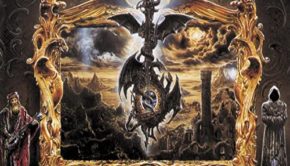25th Anniversary Spotlight – Nine Inch Nails: Broken
By guest contributor Jason Myers
1989’s Pretty Hate Machine was an industrial gateway drug for many—including myself—who were beginning to open to a world beyond their classic rock and traditional metal boundaries. Suddenly, we weren’t the only long hairs in the smoking lounge at art school. Kids with black military cargo pants were chilling side by side with the prog nerds, heshers and goths. This amalgam was encapsulated nicely in a local(ish) “band” named Nine Inch Nails, who those in the know realized was primarily the brainchild of angsty producer and recovering synth pop songsmith Trent Reznor. But while the sounds on Pretty Hate Machine were catchy and sort of heavy, overall it still felt too… well, pretty. At least to those of us who were driving down the Morbid Angel, Napalm Death, Obituary lane.
Fast forward three years, an eternity when you’re a teen-aged music junkie looking for your next fix. 1992 saw Trent and co. (specifically Flood, Martin Atkins and Chris Vrenna) unleash a much darker, heavier beast of an EP titled Broken. With a much edgier guitar production and a blistering single and video named “Wish” this new NIN machine rivaled anything the punk and thrash bands of the era were releasing in terms of sheer heart-pounding anger. Broken was a better fit for those of us who noticed Ministry was right behind Metallica, both in the record store bins and in popular culture.
The single “Happiness In Slavery” and synthetic “Suck” were essentially a bridge from the poppier dark dance metal of their debut’s monster hit “Head Like A Hole” into a new realm that would soon produce era-defining club (and begrudgingly, MTV) anthems like “Closer.” With therapeutic angsty cuts like “Gave Up” and the plodding “Physical” driving Trent’s message in with minimal subtly and maximum force, Broken always felt like more of a prelude to future greatness than perfect in its own right. It was the sound of a musician who’d just found the keys to the kingdom and was getting ready to unlock the door for himself as a bona fide arena rock god and for an entire generation of lost souls who didn’t fit in neatly to the other genre tags the music industry was trying to shuffle us into.
Heavy, textural, experimental, synthetic yet organic — even the fiery gatefold digipak and early usage of “hidden tracks” on Broken showed the world that Reznor was an artist who considered every aspect of his craft carefully and was comfortable being a trailblazer during this transitional time in music history.

Jason Myers is the bassist and founder of Icarus Witch.











